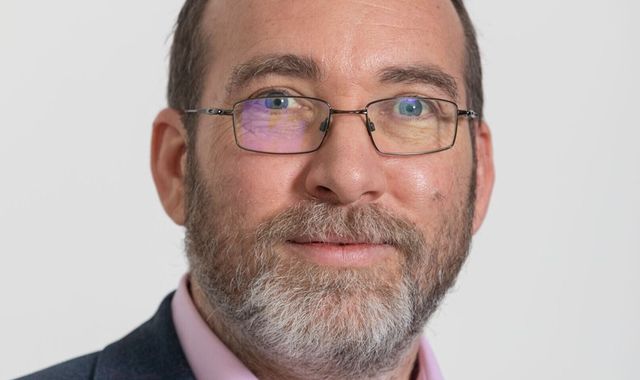
If you've ever spent your morning commute daydreaming about starting afresh with your career, this feature is for you. Each Monday, the Money blog speaks to someone from a different profession to discover what it's really like. This week we chat to consultant child and adolescent psychiatrist at Berkshire Healthcare NHS Trust, Dr Guy Northover...
The pay is good, but the career path is a long one... After five or six years at medical school, you are usually earning about £36,000. This salary goes up as you progress through the resident doctor stages to £70,000 - it takes a minimum of eight years. Once you become a consultant, the salary increases again, and for a full-time consultant child and adolescent psychiatrist, you can expect to earn between £105,000 and £140,000 depending on experience.
Money latest: Today's blog
A great advantage of working in the NHS is that you get a really good pension... through a Career Average Revalued Earnings (CARE) scheme. This means that for each year of membership, a fraction of your pensionable earnings is added to your pension pot and then revalued annually until you retire. Contributions are tiered, starting at 5.5%; however, I contribute 12.5% of my salary to this pension, and my employer adds a further 22%.
Children and their families can be affected by money worries... Parents often need to stay at home to look after their children, taking them to appointments, which can require a lot of travel time and cost, while also taking a step back from work so that they can do this. Young people on the road to recovery won't just need therapy or medication but also opportunities to engage with society through clubs, the gym and meeting friends which all ends up costing money as well.
My job does make me cry... I think that every child and adolescent psychiatrist will find themselves struggling with the emotions that arise out of supporting very unwell young people. Fortunately, this is well recognised, and in my experience, I have been supported right from the beginning of my training. Psychiatry trainees are expected to be part of support groups, we have peer supervision to discuss complex cases and the impact that it is having on us, and mentoring is encouraged at all levels of expertise. It's important that psychiatrists (as well as the wider healthcare workforce) can access comprehensive mental health and wellbeing support. I know the college is calling for ring-fenced funding for this. Holidays and finding ways to relax outside work are also really important.
Demand for child and adolescent mental health services is far greater than what can presently be offered but... the biggest issue is the understanding of the difference between emotional wellbeing and mental health in children and young people. There has been a significant increase in mental health issues and a significant decrease in emotional wellbeing, but when the two things become confused, it makes support for both worse.
Emotional wellbeing can be how you feel about exams... peer pressure, how you cope with day-to-day challenges and how you recover from feeling sad. If this is seen as a mental illness, then there is a risk that people who could help (schools, parents, community support) feel that they cannot help, so you end up being referred for specialist help and waiting a lot longer for a level of support you may not need. On the other hand, if mental illness is seen as an emotional wellbeing problem, then you may not be referred for the right level of support and people may start thinking that feeling sad is the same thing as feeling severely depressed and set up the wrong services to help. This can lead to a situation where there is not enough expertise or services for people with severe depression, and those young people end up with support that does not help them. However, it is obviously the case at the moment that there are not enough child and adolescent mental health services to meet the level of need, and there is not a situation of overdiagnosis (most likely we are still underdiagnosing).
I would encourage parents to find time and space to talk to their child from an early age... let them build up the confidence to talk to you about difficult things when their life is going well so that when it is not going well, they are still able to talk to you. If your child is not talking to you as a parent, if you don't know what their worries, fears, anxieties or ambitions and goals are, then they may have a lot going on that is affecting their emotional wellbeing.
The impact of social media is a really big subject... which does not have an easy answer. We are seeing more and more research showing that having a mobile phone and using social media at a young age may impact someone's mental health but exactly why is still not clear. There are obvious things that can harm our mental wellbeing through social media, and we should absolutely be ensuring that young people are not exposed to these things, but there are also positives such as sharing useful information and experiences.
Parents and carers can support children with smartphones... by having open discussions about how they can stay safe on them and what they may encounter in online spaces. It's also important to balance screen time with other activities such as socialising, exercising and sleep.
All the young people I see are memorable for one reason or another... and I believe that I learn from every young person I meet in clinic. Many of the young people I see are initially struggling with their own thoughts, not able to go to school, not able to leave their home. It is amazing to see them get better, recover and find themselves happy with their lives.
I focus on young people who are presenting with psychosis... Psychosis is a very severe symptom of mental illness where a person is not able to think clearly, and their brain starts making links between thoughts and ideas where there are no links. This usually results in someone believing that very strange things are happening when they are not and hearing/seeing things that are not there.
There has been a definite increase in the number of child/adolescent referrals for mental health difficulties... such as anxiety, depression, eating disorders, autism and ADHD; however, there has not been an increase in psychosis.
Read more of this feature:
'I'm a brain surgeon - here's how to keep your mind healthy'
'I'm a hair surgeon - here's the celebrity with the best transplant'
The biggest source of stress for young people is... school. Of course, not every young person finds school stressful but when school goes wrong, either because of learning challenges or friendship challenges, it becomes hugely challenging. I think in part this is because of how society links poor school grades with failure (which it absolutely should not) and how you can no longer leave school problems at school.
As a young person, you are continuously linked to school through homework and social media... If you are bullied, this can now continue at home. If you are struggling at school, you are reminded of this both through the way homework is set through apps and through the social media messages of other young people who are not struggling.
One thing everyone can do to improve their mental health is... sport, sport and more sport! Sport is fantastic, it is an exercise which we know improves mental health, but it is also a social activity. Socialising improves mental health, gets us away from our phones and gets us fresh air.
We work in sessions that are each half a day... I complete 10 sessions every week, which equates to 40 hours or five days. On top of this, we usually do "on calls" which is out-of-hours work where we usually do not need to see a young person but may give telephone advice. This varies from area to area, but I am on call around two nights a month. We also get dedicated time for professional development to stay up to date. I use some of this time to be involved in research and some to work at the Royal College of Psychiatrists, which sets and aims to raise the standards of doctors in mental health care.
I usually get into the office between 8am and 9am... to check any emails I have received around my research and Royal College work. During the morning, I will see patients. I work in a very specialist team that does much longer complex assessments of young people, so I may see one new patient and review two patients I already know in a morning. I will also take some phone calls and talk to other members of the team about the young people we are supporting. In the afternoon, I will do management work, or I may have a clinical team meeting followed by a home visit.
One frustration is... the amount of paperwork that we have to do, so usually the last couple of hours of the day are spent writing up all the information about the young people I have seen. Additional admin support would help address these pressures and improve the day-to-day lives of psychiatrists.
People respond to mental health difficulties incredibly well with the right help... recovery is not just possible, it is expected. Being able to access evidence-based support early makes a world of difference.

(c) Sky News 2025: 'I'm a child psychiatrist - here's the biggest source of stress for children (and my ad

 Thames Water creditors offer £1bn ‘sweetener’ in rescue deal
Thames Water creditors offer £1bn ‘sweetener’ in rescue deal
 The Russia-Ukraine war has reshaped global trade and forged new alliances
The Russia-Ukraine war has reshaped global trade and forged new alliances
 McLaren F1 arm valued at over £3bn in stake sale
McLaren F1 arm valued at over £3bn in stake sale
 Aberdeen in exclusive talks to sell investment tips site Finimize
Aberdeen in exclusive talks to sell investment tips site Finimize
 South Australia to become first place in the world to ban soy sauce fish-shaped containers
South Australia to become first place in the world to ban soy sauce fish-shaped containers






